IndustriALL Headlines are produced by IndustriALL Global Union
SOMA Mine Was Death Trap, Report Shows
INDONESIA: Another Four Workers Killed at Freeport, Rio Tinto Grasberg Mine
GLOBAL Campaign Defeats Union-Busting Attack at NXP
Precarious Workers Exposed to Higher Health and Safety Risks
Three Textile Unions Form Women’s Committee in Lesotho
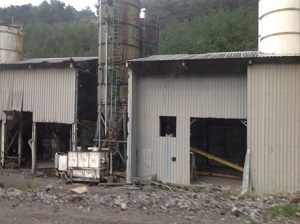 |
| The Soma Mine disaster was preventable, says an expert report. |
Oct 2, 2014 A scathing official report into the Soma mining disaster in Turkey has revealed a catalogue of negligent practices and a complete disregard for worker safety. The comprehensive analysis shows warning sensors were ignored, safety reports fabricated and ventilation systems faulty. Three hundred and one miners were killed in the tragedy in May.
The much-anticipated 126-page expert report, commissioned by the Turkish public prosecutor, clearly states the catastrophe was preventable. While eight high-level managers of the mine’s operating company have already been arrested in connection with the tragedy, the report points the finger of blame at almost everyone involved in the mine, including ministry bureaucrats, with the exception of the miners themselves. “The only innocent group is the workers,” says the report.
The Soma mine is owned by a state-owned company Turkish Coal Enterprises (TKI) and operated by a private company, Soma Kömür ??letmeleri A.?.
Inspectors were able to capture data from the alert and security systems at the mine during the three months before the tragedy on May 13 this year. The report shows that despite fluctuating carbon-monoxide readings and excessively high temperatures prior to the accident, miners continued to work.
Alarmingly, inspectors also found that most safety records were not consistent with the readings from sensors. They had been regularly fabricated. In some cases, safety records had been copied and pasted from the week before. Inspectors counted a total of 48 gas and 19 carbon monoxide sensors but many were broken and there was no proper calibration. Even those in use were not properly calibrated to measure gas levels.
“The gas measuring sensors established for monitoring the air in the mine alerted the start of the accident but the situation was not taken into consideration by company officials,” says the report.
Four days after the disaster, inspectors found underground carbon monoxide levels were still life threatening at 500ppm, which is ten times above the maximum recommended exposure of 50ppm. The report says that gas masks are crucial for miners working in conditions with high exposure to carbon monoxide and yet the masks were not checked regularly. According to the autopsy reports, 85 per cent of the killings were from carbon monoxide poisoning.
Crucially, the ventilation system was not adequate to meet the rapid expansion of the mine in recent years and had not been adapted accordingly. The ventilation plans for the mine did not even correspond to the real ventilation system underground.
The report blames poor ventilation for actually accelerating the loss of life, as it was unable to reverse the flow of carbon monoxide underground creating death chambers for the miners. It also blames the ventilation system as a “very negative factor” in rescue efforts.
Furthermore, poor communication systems were criticized for not working or meeting standards for underground operations. There was neither an evacuation plan nor compulsory vocational training for workers related to health and safety.
Kemal Özkan, assistant general secretary at IndustriALL Global Union, led a global solidarity mission to Turkey in the wake of the Soma mine disaster. He states:
“The senseless disregard for miners’ safety on the part of owners, management and government almost beggars belief. Lives have been sacrificed for lies. In a relentless drive for profits, sensor warnings were ignored, safety reports falsified, and ventilation systems fatally flawed. As a result, the industrial homicide at Soma left 301 miners dead and 432 children without fathers. The report brings nothing but shame on the Turkish mining industry.”
The pattern of highly intensive mining since Soma Kömür ??letmeleri A.?. took control in 2009, led to production levels that were 2.5 times more than was planned. The company was able to extract 15 million tonnes of coal by May 2014 instead of by the original target date of March 2017. The report says: “We are of the opinion that this data confirms the claims or allegations of the workers of highly intensified workload and the production pressures.”
An additional report into the Soma disaster by the Turkish association of chambers of engineers and architects TMMOB, states: “The reason for the carnage is privatization, marketization and the outsourcing policies over the past 12 years in the mining sector and also in the area of health and safety.”
The expert report, which will be used by the public prosecutor for his indictment, singles out people it considers culpable for the accident. The long list includes: the employer; employer representatives; permanent supervisor; technical supervisor; all the shift supervisors in charge of safety; all safety experts; the engineer responsible for underground ventilation; employees responsible for recording the data from the sensors; TKI’s chief control engineer and all control engineers from TKI; the general director of mining affairs; all representatives from the mining affairs general directorate; and inspectors from the ministry of labour and social security.
The report concludes: “Our group is of the opinion that there were many negligent practices and deficiencies and finally this accident was avoidable.”
For more information, please contact:
Leonie Guguen, Communications Officer, IndustriALL Global Union
Tel: +41 (0)22 308 50 23
Mobile: +41 (0)79 137 54 36
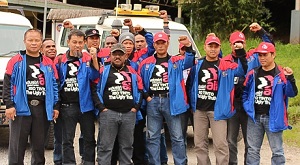 |
| Striking workers at Freeport, Rio Tinto Grasberg Mine |
Oct 2, 2014 IndustriALL Global Union condemns Freeport McMoRan and Rio Tinto for the loss of yet another four innocent lives.
As a result of an accident at Freeport McMoRan’s and Rio Tinto’s Grasberg mine on 27 September 2014 four mineworkers lost their lives. Four more miners were injured and one of them seriously hurt.
On 1 October IndustriALL affiliate Chemical, Energy and Mines Workers Union (CEMWU) representing the majority of the workers at Grasberg mine went on strike and blocked the road to the mine demanding punishment of the director of mining, provision of guarantees of no more fatal accidents and for the company to pay financial support to the families of the deceased and injured. Following the strike the management came into negotiations and agreed to workers’ demands, after which the strike stopped.
In the aftermath of the Grasberg mine disaster, serious questions were raised about Freeport McMoRan’s and Rio Tinto’s commitment to mine safety. Earlier in September another worker was killed in a rockfall at Grasberg mine . These tragedies happened less than two years after 28 mineworkers died at Grasberg mine in what was described as the worst mining accident in the history of Indonesia. Another accident at the Grasberg mine killed 11 mineworkers in 2003.
In the wake of the mine accident at Grasberg on 14 May 2013, IndustriALL Global Union organized a high level delegation to Indonesia to protest against the killing of mineworkers in accidents proved to be preventable. At the end of the mission the delegation concluded that the accident clearly illustrated the urgent need for the ratification of ILO Convention 176 in Indonesia.
Jyrki Raina, IndustriALL General Secretary says,
“Our condolences go to the families of the perished workers. This should not have happened. How many more lives must be lost at Grasberg before Freeport McMoRan and Rio Tinto take the safety and health of mineworkers seriously and invest in health and safety? How many should die before the Government of Indonesia decides to ratify ILO Convention 176 on mine safety? I urge now the Government of Indonesia to assume their full responsibility and urgently to start designing a safety program to prevent more deaths and injuries of workers”.
The Ministry of Energy and Mineral Resources has temporarily shut down the mine for the purpose of investigating the accident. Without preempting the outcome of the investigation into this accident, IndustriALL Global Union joins the call by the Confederation of SPSI, the National Center of CEMWU-SPSI and FSPMI-KSPI demanding ratification of ILO Convention 176. In addition, IndustriALL Global Union supports the demands of our affiliates to:
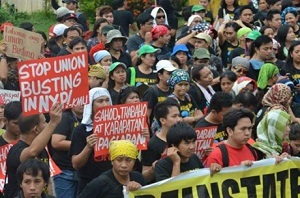 |
Sep 29, 2014 International trade union solidarity flexed its muscles over the last five months in defence of NXP workers under attack in the Philippines. The campaign succeeded in overturning this company’s union-busting attack. A new labour agreement with major gains was signed on 26 September.
Twelve dismissed members of the union’s executive will return to work, the other twelve will receive decent separation packages and become full time trade union activists, wage hikes of 12.25% over three years will be much higher than what the company previously said was possible, and a significant number of contractual workers will be regularized. But most important for the NXP workers, the company’s brutal attempt to bust the union was defeated.
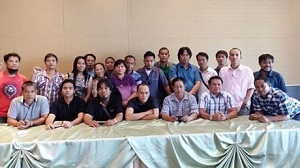 |
| The leaders of the NXPSCI Workers Union at the signing of the Collective Bargaining Agreement 2014-2016 |
See the official MWAP statement here.
Dutch multinational NXP Semiconductors sacked all 24 elected union officials at its plant in a special economic zone in Cabuyao on 5 May for taking time off on national holidays.
A number of security measures meant to intimidate workers were taken. The zone was flooded with police, shuttle buses for the workers were heavily guarded, checkpoints were put up and goons wearing civilian clothes patrolled the plant.
“It appeared that NXP and the government were colluding to destroy one of the only unions present in the special economic zone,” said IndustriALL General Secretary Jyrki Raina. “IndustriALL worked closely with MWAP and allies to mount a powerful campaign.”
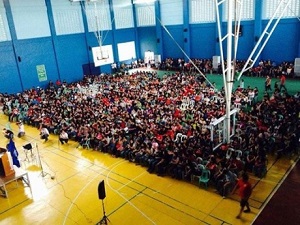 |
| The NXPSCI Workers Union hold a general meeting to discuss the Collective Bargaining Agreement |
An impressive local campaign by MWAP was supported internationally. Actions included large pickets outside of negotiations venues, and the NXP facility, national mobilizations, national support from all 15 IndustriALL affiliates in the Philippines, corporate customer action especially focussed on Apple who received over 150,000 petitions and 14,000 official complaints through SumOfUs, a wide-reaching social media campaign flagging the labour rights flaw in the new iPhone 6, outreach and collaboration with the business and human rights community spread the news and built support for MWAP, and a LabourStart campaign targeted NXP management.
More support came from international partners in the form of demonstrations at Apple Stores by United Students Against Sweatshops (USAS) in Los Angeles and Chicago, with participation from USW activists and leaders. Further demonstrations were planned had settlement not been reached.
IndustriALL outreached to unions representing NXP workers in other countries to build support for MWAP. It also worked with unions at many of NXP’s top customers to pressure these customers to demand that NXP end its attack on MWAP.
A number of IndustriALL affiliates including AMWU, IF Metall, IG Metall, Metalliliitto, Unite and USW provided critical support in the campaign. IndustriALL’s sister global union UNI also provided critical support.
“We believe that we have waged a strong battle resulting in a major victory,” said Reden Alcantara, MWAP National President and one of the 12 union leaders who will not return to work for NXP. “We encountered many difficulties in this long and painstaking struggle but we never stopped searching for solutions. We have come this far because of the unity of our members and the all-out support of our global union IndustriALL and of our other supporters and friends from the local and international community.”
“The NXP management failed to bust our union. That, to us, is our biggest victory.”
Oct 2, 2014 Three out of four workers killed last week at a mine in Indonesia partially owned by Rio Tinto were precarious workers. Next Tuesday, on 07 October, IndustriALL affiliates at Rio Tinto will join the global Campaign to “Stop precarious work” to demand to Rio Tinto respect for workers’ rights, healthy and safe workplace and that the company stop undermining jobs through the use of precarious work.
The majority of the unions at Rio Tinto currently surveyed on the precarious work situation at their worksites have reported the increased use of this type of work. In France, precarious workers represent around 25 per cent of the workforce whereas five to ten years ago, they represented only five per cent of the workers. At Qit Madagascar Minerals in February 2014, the precarious workers were twice more numerous than the direct employees. The redundancy of permanent workers, while keeping casual workers at Hail Creek mine in Australia in May this year illustrates very well Rio Tinto’s race to maximise its profits, trying to replace its permanent workforce with precarious workers.
Rio Tinto uses triangular employment relationship to escape its responsibility, and undermine trade union work. See the case of the firing of hundreds of OMEGAs employees in Madagascar.
The accident in Indonesia shows once again that precarious workers at Rio Tinto are no exception to the rule that they are more likely to be victim of a health and safety accident than permanent workers. Unions in some Rio Tinto worksites indicated that outsourced workers were treated differently than permanent workers in H&S perspective. On one site, precarious workers receive on the contrary of direct employees, antiquated protective equipment. This is not the only difference of treatment that outsourced workers have to face at Rio Tinto. In South Africa the wage gap between outsourced workers and direct employees is reported by the union to be huge. Precarious workers receive very low salaries; they do not get any bonuses. In Alma Quebec, the precarious workers earn until 50 per cent less than permanent and direct workers.
The Rio Tinto global Network denounced this situation last February in Cape Town. Therefore, as part of the Rio Tinto Global Campaign, the network chose 07 October to organize a Global Day of Action at Rio Tinto, the day on which unions around the world mobilize against precarious work.
Unions at Rio Tinto have already fought back to limit the use of precarious workers. In 2012, in Canada, after a six-month lockout at Rio Tinto in Alma, the United Steel Workers (USW) succeeded in negotiating a collective agreement limiting the use of outsourced workers to 10 per cent of the worked hours. In Kitimat, UNIFOR reported that the CBA language limits the use of temporaries employees to 6.5 per cent of the total hours worked. Other unions are taking the issue in the agenda of their collective bargaining.
Once again, on 07 October unions at Rio Tinto will say : “NO to precarious work!”
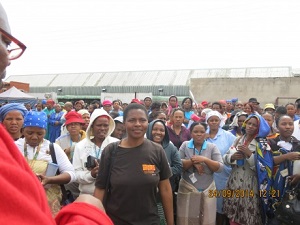 |
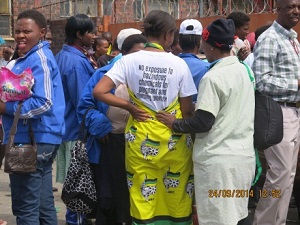 |
Oct 1, 2014 “I want to work in a safe place and have a good salary and enough rest.” This was the testimonial from one young woman who participated in the meeting in Maseru on 24 and 25 September 2014.
The purpose of the meeting was to create an IndustriALL women’s committee in Lesotho, where about 14,000 textile workers belong to three different unions, FAWU, LECAWU and NUTEXT out of about 40,000 workers. These unions are likely to come together soon to form one union. The textile factories belong to South African or Chinese owners.
The women identified the following issues as being ones that need attention: insufficient toilet time, blocked or locked exits, fainting, excessive targets, sexual harassment, low pay which makes some women resort to prostitution, not enough sleep, insufficient maternity leave, HIV and AIDS. They worked on the basis of body mapping, workplace mapping, life mapping as well as visualization of dreams.
The women knew about one factory where the maternity leave went up from two weeks to 12 weeks. It is Springfield Manufacturing, a South African-owned company. The union negotiated and started by demanding a 15% wage increase. What they achieved was 8% plus the increase in maternity leave from 1 May this year. Everyone agreed on this demand. The union holds mass meetings regularly and asks workers what their demands are. There are about 1000 workers at that factory, with about 80% women. They have some women shop stewards. Everyone at the factory is on permanent contract. The employer pays the maternity benefit. In the meantime they are working on having social security pay the maternity benefit.
Six women were elected to coordinate the committee and keep contact with IndustriALL. To start with they will work to fight discrimination against men and women by:
The women understood that in the future unions must sign agreements that cover more than just money. That will make it more feasible for women’s concerns to be taken up such as maternity leave or sexual harassment or HIV and AIDS. As a first step members need to be educated about social benefits and rights. The women went home with a greater feeling of self-esteem and empowerment.